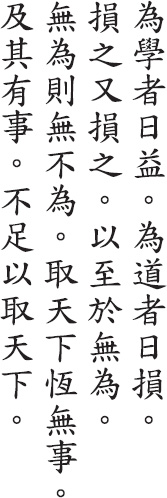48
 |
Those who seek learning gain every day those who seek the Way lose every day they lose and they lose until they find nothing to do nothing to do means nothing not done those who rule the world aren’t busy those who are busy can’t rule the world |
HO-SHANG KUNG says, “‘Learning’ refers to knowledge of administration and rhetoric, ritual and music.”
CONFUCIUS asked Tzu-kung, “Do you think I learn in order to increase my knowledge?” Tzu-kung answered, “Well, don’t you?” Confucius replied, “No. I seek the one thing that ties everything together” (Lunyu: 15.2).
SUNG CH’ANG-HSING says, “Those who seek the Tao don’t use their ears or eyes. They look within, not without. They obey their natures, not their desires. They don’t value knowledge. They consider gaining as losing and losing as gaining.”
YEN TSUN says, “Get rid of knowledge. The knowledge of no knowledge is the ancestor of all knowledge and the teacher of Heaven and Earth.”
WANG PI says, “Those who seek learning seek to improve their ability or to increase their mastery, while those who seek the Tao seek to return to emptiness and nothingness. When something is done, something is left out. When nothing is done, nothing is not done.”
HUAI-NAN-TZU says, “Those who are wise cultivate the inner root and do not make a display of the outer twigs. They protect their spirit and eliminate cleverness. They do nothing, which means they don’t act until others act. And yet there is nothing that isn’t done, which means they rely on the actions of others” (Huainantzu: 1).
TE-CH’ING says, “Those who seek the Tao begin by using wisdom to eliminate desires. Thus, they lose. Once their desires are gone, they eliminate wisdom. Thus, they lose again. And they go on like this until the mind and the world are both forgotten, until selfish desires are completely eliminated, until they reach the state of doing nothing. And while they do nothing, the people transform themselves. Thus, by doing nothing, the sage can do great things. Hence, those who would rule the world should know the value of not being busy.”
KUMARAJIVA says, “Those who lose eliminate everything coarse until they forget about the bad. Then they eliminate everything fine until they forget about the good. The bad is what they dislike. The good is what they like. First, they eliminate dislikes. Then, they eliminate likes. Once they forget their likes and dislikes and cut themselves off from desire, their virtue becomes one with the Tao, and they reach the state of doing nothing. And while they do nothing, they let others do what they want. Hence, there is nothing that isn’t done.”
SU CH’E says, “Everyone wants to rule the world. But when people see others doing something to possess it, they cringe. And when the people see the sage doing nothing, they rejoice. Those who are wise do not seek to rule the world. The world comes to them.”
TS’AO TAO-CH’UNG says, “When someone uses laws to restrict the world, might to compel it, knowledge to silence it, and majesty to impress it, there are always those who don’t follow. When someone rules by means of the Tao, the world follows without thinking. ‘The world’ refers to the ten thousand things.”
WEN-TZU says, “In ancient times, those who were good rulers imitated the sea. The sea becomes great by doing nothing. Doing nothing, it governs hundreds of rivers and streams. Thus, it rules by not being busy” (Wentzu: 8).
Although the Kuotien texts omit the last three lines, they are present in all other editions and are present or implied (by the spaces) in both Mawangtui texts.